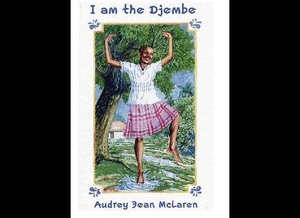
Title: 'I am Djembe'
Author: Audrey Jean McLaren
Illustrated by: Lionel Drew
Publisher: Cultural Waves
Reviewed by: Shaunette Jones
AT FIRST glance, I thought this book was directed at a child audience because of the cover illustration. But, browsing, I realised that the poems encapsulate subjects a child would not readily grasp. I am Djembe, written by Audrey Jean McLaren, is a collection of 64 poems that touch on various themes, ranging from love and lies, to family and friends, to innocence and betrayal, to a celebration of culture, racism, identity crisis and child abuse.
What is the djembe? Originating in West Africa, the djembe is a skin-covered hand drum, shaped like a goblet, first made by the Mandika/Susu blacksmiths of that region. It is played using bare hands and is used in important ceremonies, rituals and also as a conveyor of messages over long distances. It facilitates expression, giving a sense of power and freedom. The djembe is the drum, the song and the dance.
strong comparison
The title befits the book, as the words of each poem can be compared to a djembe. There is a rhythm to each poem, the words resounding like the beat of the drum - communicating messages - of love, of a child's pain, his/her sense of fear, despair and hopelessness; they recreate an adult's lust and yearning for childhood, the sometimes bitter, unrelenting nature of adults, the unrealistic expectations they sometimes have of children and the evidence of racism in this 'modern' world.
Speaking of racism, McLaren tells of 'The Attitude' someone has towards Jamaica and her educated status: "So, where are you from? Jamaica. Jamaica? And you speak English? Yes, is something wrong with that? I have never heard a Jamaican speak English before ... Do you mean you have a Bachelor degree? No, I have two degrees, a Bachelor of Arts and a Master of Arts. That means you were educated in the USA? No, I was educated in Jamaica. I did not know that they have educated people on that island."
And the 'people on that island' are deeply cultural, even if they are far away from home. This is evident in 'Fe Mi Ring Ding' and 'Story Time'. McLaren writes the Patois so well, the words jump at you, bringing the stories to life. 'Fe Mi Ring Ding' pays tribute to Louise Bennett-Coverley, as a number of her poem titles are used.
The reading of 'Nostalgia' will remind you of things Jamaican, "where children wear uniforms to school ... where moons are hoisted on sticks and the kitchen is lit by a bitch ... where Peenie-wallie flies by night ... [and] soups go by the names mannish water and fish tea ... mongrel dogs are commonplace and roam the streets overturning garbage cans and barking at the heels of the postman".
voice for children
The book provides a voice for children, real and imagined. The first two poems, 'Little Fish' by Mufan Yang and 'A Perfect Place' by Natasha Dias, are written by 12-year- olds. The latter (Dias' poem) speaks of a place where peace dwells, where nothing disturbs, a place where one goes after death. Other poems, such as 'She Cannot Sing' (pg 70), "Badge of Honour" (pg 74), 'Tough One' (pg 76) and 'A Child's Cry' (pg 81) all speak of child abuse and deep, unrelenting pain.
The abuse is made even clearer in 'A Child's Cry'. A little girl prays to God for help, because her mother does not listen to her desperate cry.
highly erotic
What McLaren calls highly erotic is seen in 'The Gift'. She writes: "I want you to spread my limbs, and take what I'm lustfully giving you. For like Eve, I am presenting to you an apple ... I am offering you the first taste ... I want you to eat, With lips, teeth and tongue ... Bite in with the passion of David, And penetrate with the strength of Samson."
The author writes of lust, but she also writes about love and the need for family. 'Grandma's Legacy' speaks of family traditions. In 'Love' and 'My World', a mother's love and care shine through the eyes of her children, a grave contrast to the emptiness and far-removed state the child feels in 'Innocence Lost'. 'My World' says: 'I feel like a chef, as I hang from her side, while she cooks the evening meal. She won't put me down." 'Love' reinforces: "The hands that cradled me were as hard and cracked as the weathered beams of an old house - but the breath that caressed my face was warm." But 'Innocence Lost' states: "My head is like an unmarked grave, My tongue won't say for what I crave - I curl like an embryo on a science chart, Divorced from a womb and a mother's heart."
'I am Djembe' tells of joy, cleansing, unrestricted freedom and the sweetness of the things nature has to offer. The author mentions ... in the rain I prance barefooted - my plaits pulling like nylon strings, I close my eyes, Feeling only the beat of the rain's fingers on my head."
This is McLaren's second collection of poems. Her first was Bareface Pickney: An Anthology of Poems, published in Jamaica in 1999 and in Canada in 2006. She has also published an anthology of poems by her students, titled The Power of Words.